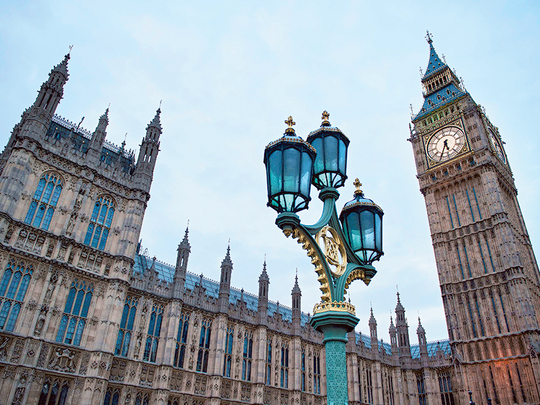
London: Sniffing white powder with prostitutes, expenses scandals — members of Britain’s House of Lords usually only hit the headlines for their colourful extra-curricular activities, but one recent debate proved an exception.
The unelected upper chamber of parliament on Monday held a series of votes which forced Prime Minister David Cameron’s government to rethink a controversial part of its austerity drive.
The result has reminded the public that the Lords are more than a group of ageing grandees nodding off on red leather benches after lunch.
“I haven’t been stopped so many times getting on the train as I have been in the last few days with people saying: ‘It’s just really good you did that,’” Lord Steve Bassam, Labour’s chief whip in the Lords, told AFP.
“To have something where it is seen to be relevant and on the side of the public I think is quite good news.”
The issue has also sparked an angry row at Westminster, where Cameron announced a review of the Lords’ powers the day after it voted to delay the £4.4 billion (Dh25 billion) of cuts to tax credits, a welfare payment aimed at low-income families.
The government claims the Lords caused a “constitutional crisis” by exceeding its powers under Britain’s unwritten constitution.
Although the Lords usually acts as a revising chamber, ministers say it overstepped the mark by impeding a finance measure which the elected House of Commons had previously voted for three times.
The review will be chaired by Conservative Lord Tom Strathclyde — Thomas Galloway Dunlop du Roy de Blicquy Galbraith, 2nd Baron Strathclyde, to give him his full title.
Labour dismisses it as a “smokescreen” designed to hide the government’s embarrassment at the opposition to its policy, including from within Cameron’s own Conservative Party.
Even before the tax credits debate, there was broad agreement that the Lords needed reform — but no one knew how to do it.
Britain’s upper house, with 819 members, is the second-largest parliamentary chamber in the world, beaten only by China’s National People’s Congress.
It includes 88 lords who inherited their titles, the oldest of which is held by Margaret, 31st Countess of Mar, and dates back to 1014. Most hereditary peers were removed by reforms in 1999.
There are also 25 Church of England bishops, making Britain the only country in the world besides Iran to have unelected clerics in its legislature, according to Conservative MP Liam Fox.
They took a vocal part in the tax credits debate, with the Bishop of Portsmouth calling the cuts “morally indefensible”.
Most of the rest are politicians put forward by their own parties.
Among recent arrivals is Conservative Viscount Hailsham, who as Douglas Hogg MP famously claimed taxpayers’ money to clean his moat, earning the media nickname ‘Lord Moat’ in a 2009 expenses scandal.
A recent departure was Labour’s Lord John Sewel, nicknamed ‘Lord Sewer’, who quit in July after being pictured allegedly snorting cocaine with prostitutes.
With members of the Lords able to claim a £300 daily attendance allowance, 60 per cent of Britons believe there are too many of them, a YouGov opinion poll found in September.
Cameron’s government is not pursuing root-and-branch Lords reform. An attempt to do so under his previous coalition government was abandoned in 2012 amid Conservative opposition.
Strathclyde’s review is instead expected to focus on limiting the ability of the Lords to vote down finance-related legislation.
Cameron has suggested, though, that he would like the composition of the Lords — where Conservative peers are currently outnumbered by Labour and the Liberal Democrats — to better reflect the Commons, where he has a slim majority.
Senior Conservative Kenneth Clarke, a minister under Margaret Thatcher, explained the government’s problem.
“If the Lords keep repeating these party political votes, it will be almost impossible to have stable governments taking firm and difficult decisions for the remainder of this parliament, when presumably they will start misbehaving with ever more frequency,” he said.
Professor Meg Russell, director of University College London’s Constitution Unit, advised ministers not to inflame tensions over the review.
“The best strategy for ministers is almost always to avoid defeat altogether by thinking through in advance what parliament … will be able to accept,” she said.
But in the long-term, significant reform of the Lords still looks a long way off.
“It’s a very entrenched part of the British establishment and it’s very tempting once you get in here to protect what you’re part of,” Bassam said.











